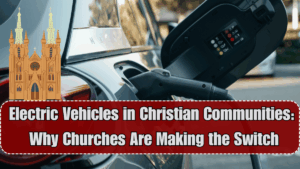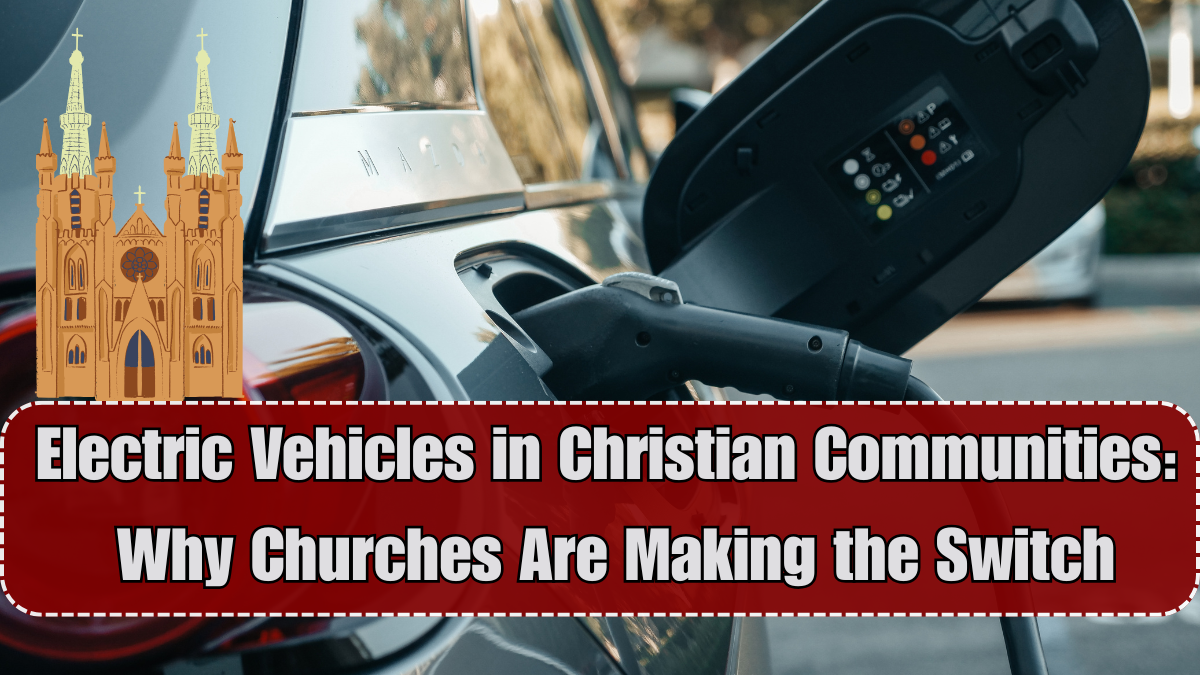The movement toward electric vehicle adoption in Christian communities across the USA has accelerated significantly in 2025. What started as a few pilot projects involving faith-based sustainability groups has now turned into a nationwide mission of integrating clean energy transportation into church operations, community outreach, and faith-led initiatives.
Churches have traditionally played a vital role in community transformation, and their embrace of electric vehicles (EVs) now adds an environmental dimension to their spiritual leadership. This shift isn’t just about replacing petrol vans with EVs; it reflects a deeper alignment of faith, stewardship, and sustainability.

Why Christian Communities Are Turning to EVs in 2025
The EV shift rural faith groups are experiencing stems from a combination of environmental consciousness and long-term cost savings. Churches—especially in rural America—are looking to reduce their carbon footprint while making responsible use of donations and budgets.
Top reasons for electric vehicle adoption in Christian communities:
-
Lower operational and maintenance costs for church vans and buses
-
Access to federal and state EV tax credits and nonprofit discounts
-
Emphasis on environmental stewardship as part of Biblical values
-
Positive witness in surrounding neighborhoods and outreach programs
-
Seamless use in Sunday services, youth trips, and charity work
The transition is also supported by various EV USA policies, including grants for community-based EV projects and free charging station installation programs for nonprofit institutions.
EV Models Being Used by Churches
Here are some of the most popular electric vehicles chosen by Christian organizations and churches in 2025:
| EV Model | Use Case | Estimated Range | Notes |
|---|---|---|---|
| Ford E-Transit | Church van for Sunday transport | 125 miles | Spacious and ADA-compliant |
| Nissan Leaf | Pastor’s daily commute | 149–212 miles | Compact, affordable |
| Rivian R1S | Youth ministry travel | 260–320 miles | Rugged, all-terrain ready |
| Chevrolet Bolt EUV | Volunteer outreach & deliveries | 247 miles | Good cargo space |
| Tesla Model Y | Senior ministry and family use | 300 miles | Popular among urban churches |
These EVs are often bought with a combination of church donations, nonprofit grants, and government-backed incentives, helping to reduce the upfront investment for faith-based institutions.
How Churches Are Supporting the EV Movement
The Christian outreach green ministry movement is not limited to just buying EVs—it extends to full-scale community advocacy and education. Churches have become information hubs where members can learn about electric vehicles, charging infrastructure, and sustainability best practices.
Ways churches are promoting EV adoption in Christian communities:
-
Hosting “Green Sunday” events to showcase their EV fleet
-
Installing EV charging stations for public use in parking lots
-
Educating youth groups on climate and clean mobility
-
Partnering with local utilities to promote off-peak charging
-
Participating in national EV awareness months
With these activities, faith leaders are positioning environmental action as a form of spiritual responsibility and civic duty.
Benefits for Congregations and the Environment
Adopting electric vehicles brings direct and indirect benefits to both church operations and the planet:
-
Financial savings: Lower fuel and repair bills mean more funds for charity and outreach
-
Cleaner air: Especially beneficial for churches located in urban or high-traffic areas
-
Community leadership: Inspires others to take sustainable actions
-
Faith-driven environmentalism: Reinforces values of care for creation and future generations
The EV USA community continues to grow, and faith groups are becoming vital participants in America’s green transition.
FAQs
Are churches eligible for EV purchase subsidies in the US?
Yes, many churches qualify for nonprofit incentives, state EV rebates, and even infrastructure grants.
What kind of EVs are suitable for church use?
Vans like the Ford E-Transit and multi-seater models like Rivian R1S are popular for group transport, while sedans work for daily needs.
How are churches paying for these EVs?
Through a mix of federal credits, donations, green grants, and support from local utilities or city partnerships.
Can churches install EV charging stations?
Absolutely. Many states offer free or subsidized charging infrastructure for churches and community centers.
Is EV maintenance more affordable than traditional vehicles?
Yes. EVs have fewer moving parts and lower fuel costs, making them more economical in the long run.
Why is EV adoption considered a Christian value?
Many see caring for the environment as a Biblical principle, and switching to EVs is part of their mission of stewardship and love for creation.
Click here to know more.
